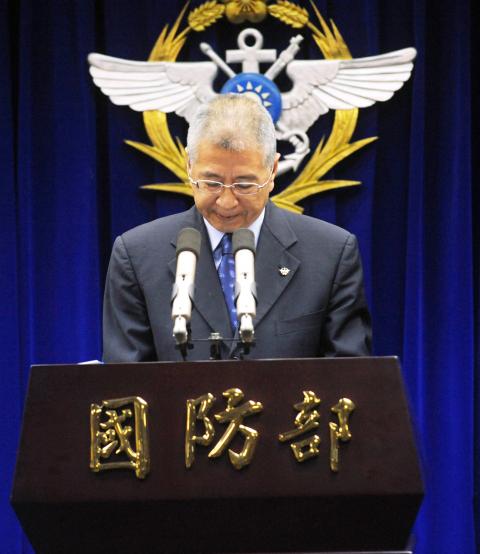Minister of National Defense Andrew Yang (楊念祖) resigned last night in the wake of plagiarism allegations, just six days after taking office.
Yang told a 9:30pm press conference at the Ministry of National Defense that some portions of a book he published in 2007 had been ghostwritten by friends, who allegedly lifted material from other works without proper citation.
Yang acknowledged his “personal negligence” and said he had decided to resign to preserve the reputation of the Cabinet, the military and President Ma Ying-jeou (馬英九).

Photo: CNA
He said he met with Ma and Premier Jiang Yi-huah (江宜樺) earlier in the evening to tender his resignation, which both men accepted.
Executive Yuan spokesperson Cheng Li-wun (鄭麗文) said Deputy Minister of National Defense Kao Kuang-chi (高廣圻) will temporarily fill in until a new minister is appointed.
Yang, who has been a member of the advisory committee for formulating national defense reports, specializes in the study of US-Taiwan-China relations and has focused his research on a cross-strait military mutual trust mechanism, the Chinese People’s Liberation Army and regional safety.
Yang had replaced Kao Hua-chu (高華柱), who resigned over the death of army corporal Hung Chung-chiu (洪仲丘).
Additional reporting by staff writer and CNA

CHAOS: Iranians took to the streets playing celebratory music after reports of Khamenei’s death on Saturday, while mourners also gathered in Tehran yesterday Iranian Supreme Leader Ayatollah Ali Khamenei was killed in a major attack on Iran launched by Israel and the US, throwing the future of the Islamic republic into doubt and raising the risk of regional instability. Iranian state television and the state-run IRNA news agency announced the 86-year-old’s death early yesterday. US President Donald Trump said it gave Iranians their “greatest chance” to “take back” their country. The announcements came after a joint US and Israeli aerial bombardment that targeted Iranian military and governmental sites. Trump said the “heavy and pinpoint bombing” would continue through the week or as long

TRUST: The KMT said it respected the US’ timing and considerations, and hoped it would continue to honor its commitments to helping Taiwan bolster its defenses and deterrence US President Donald Trump is delaying a multibillion-dollar arms sale to Taiwan to ensure his visit to Beijing is successful, a New York Times report said. The weapons sales package has stalled in the US Department of State, the report said, citing US officials it did not identify. The White House has told agencies not to push forward ahead of Trump’s meeting with Chinese President Xi Jinping (習近平), it said. The two last month held a phone call to discuss trade and geopolitical flashpoints ahead of the summit. Xi raised the Taiwan issue and urged the US to handle arms sales to

BIG SPENDERS: Foreign investors bought the most Taiwan equities since 2005, signaling confidence that an AI boom would continue to benefit chipmakers Taiwan Semiconductor Manufacturing Co’s (TSMC, 台積電) market capitalization swelled to US$2 trillion for the first time following a 4.25 percent rally in its American depositary receipts (ADR) overnight, putting the world’s biggest contract chipmaker sixth on the list of the world’s biggest companies by market capitalization, just behind Amazon.com Inc. The site CompaniesMarketcap.com ranked TSMC ahead of Saudi Aramco and Meta Platforms Inc. The Taiwanese company’s ADRs on Tuesday surged to US$385.75 on the New York Stock Exchange, as strong demand for artificial intelligence (AI) applications led to chip supply constraints and boost revenue growth to record-breaking levels. Each TSMC ADR represents

State-run CPC Corp, Taiwan (CPC, 台灣中油) yesterday said that it had confirmed on Saturday night with its liquefied natural gas (LNG) and crude oil suppliers that shipments are proceeding as scheduled and that domestic supplies remain unaffected. The CPC yesterday announced the gasoline and diesel prices will rise by NT$0.2 and NT$0.4 per liter, respectively, starting Monday, citing Middle East tensions and blizzards in the eastern United States. CPC also iterated it has been reducing the proportion of crude oil imports from the Middle East and diversifying its supply sources in the past few years in response to geopolitical risks, expanding